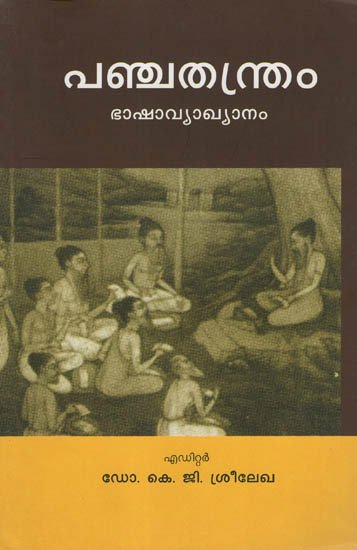Panchatantra [sanskrit]
by Dr. Naveen Kumar Jha | 2016 | 13,828 words | ISBN-13: 9788193077962
The Sanskrit edition of the Panchatantra referencing the English translation and grammatical analysis. Written by Vishnu Sharma and possibly dating as early as 1200 BCE, the Panchatantra (or Pancatantra) represents a collection of short stories teaching basic ethical values and moral conduct that was commonly practiced in ancient Indian. Alternative titles: Śrīviṣṇuśarman Pañcatantra (श्रीविष्णुशर्मन् पञ्चतन्त्र, Śrī-viṣṇuśarman pancatantra, श्री-विष्णुशर्मन्, Sri-visnusarman)
Verse 2.86
वाञ्छैव सूचयति पूर्वतरं भविष्यं पुंसां यद् अन्य-तनुजं त्व् अशुभं शुभं वा ।
विज्ञायते शिशुर् अजात-कलाप-चिह्नः प्रत्युद्गतैर् अपसरन् सरलः कलापी ॥ ८६ ॥
vāñchaiva sūcayati pūrvataraṃ bhaviṣyaṃ puṃsāṃ yad anya-tanujaṃ tv aśubhaṃ śubhaṃ vā |
vijñāyate śiśur ajāta-kalāpa-cihnaḥ pratyudgatair apasaran saralaḥ kalāpī || 86 ||
The English translation of Panchatantra Verse 2.86 is contained in the book The Complete Pancatantra: Sanskrit Text with English Translation by Dr. Naveen Kumar Jha. This book is not available online so in order to read the full text and translation you should buy the book:
Buy now! English translation by Dr. Naveen Kumar Jha (2016)
Glossary of Sanskrit terms
Note: This extracts Sanskrit terms and links to English definitions from the glossary, based on an experimental segmentation of verse (2.86). Some terms could be superfluous while some might not be mentioned. Click on the word to show English definitions.
Vancha, Sucayat, Purvatara, Bhavishya, Pums, Yat, Yad, Anya, Tanuja, Ashubha, Shubha, Shubh, Vijna, Vijnaya, Tad, Yushmad, Shishu, Ajata, Kalapa, Pratyudgata, Apa, Sarat, Sarala, Kalapi, Kalapin,
Analysis of Sanskrit grammar
Note: this is an experimental feature and only shows the first possible analysis of the Sanskrit text (Panchatantra Verse 2.86). If the system was successful in segmenting the sentence, you will see of which words it is made up of, generally consisting of Nouns, Pronouns, Verbs, Participles and Indeclinables. Click on the link to show all possible derivations of the word.
- Line 1: “vāñchaiva sūcayati pūrvataraṃ bhaviṣyaṃ puṃsāṃ yad anya-tanujaṃ tv aśubhaṃ śubhaṃ vā ”
- vāñchai -
-
vāñchā (noun, feminine)[nominative single]√vāñch (verb class 1)[imperative active second single]
- aiva -
-
√i (verb class 2)[imperfect active first dual]
- sūcayati -
-
√sūc -> sūcayat (participle, masculine)[locative single from √sūc class 10 verb]√sūc -> sūcayat (participle, neuter)[locative single from √sūc class 10 verb]√sūc (verb class 10)[present active third single]
- pūrvataram -
-
pūrvatara (noun, masculine)[adverb], [accusative single]pūrvatara (noun, neuter)[adverb], [nominative single], [accusative single]pūrvatarā (noun, feminine)[adverb]
- bhaviṣyam -
-
bhaviṣya (noun, masculine)[adverb], [accusative single]bhaviṣya (noun, neuter)[adverb], [nominative single], [accusative single]bhaviṣyā (noun, feminine)[adverb]
- puṃsām -
-
puṃs (noun, masculine)[genitive plural]
- yad -
-
yat (indeclinable relative)[indeclinable relative]yat (noun, masculine)[compound]yad (noun, masculine)[compound], [adverb], [nominative single], [vocative single]yat (noun, neuter)[nominative single], [vocative single], [accusative single]√i -> yat (participle, neuter)[nominative single from √i class 2 verb], [vocative single from √i class 2 verb], [accusative single from √i class 2 verb]yat (pronoun, neuter)[nominative single], [accusative single]
- anya -
-
anya (noun, neuter)[compound], [vocative single]√an -> anya (absolutive)[absolutive from √an]
- tanujam -
-
tanuja (noun, masculine)[adverb], [accusative single]tanujā (noun, feminine)[adverb]
- Cannot analyse tv*aś
- aśubham -
-
aśubha (noun, masculine)[adverb], [accusative single]aśubha (noun, neuter)[adverb], [nominative single], [accusative single]aśubhā (noun, feminine)[adverb]√śubh (verb class 6)[imperfect active first single]
- śubham -
-
śubha (noun, masculine)[adverb], [accusative single]śubha (noun, neuter)[adverb], [nominative single], [accusative single]śubhā (noun, feminine)[adverb]śubh (noun, feminine)[accusative single]
- vā -
-
vā (indeclinable conjunction)[indeclinable conjunction]vā (noun, feminine)[nominative single]√vā (verb class 1)[imperative active second single]
- Line 2: “vijñāyate śiśur ajāta-kalāpa-cihnaḥ pratyudgatair apasaran saralaḥ kalāpī ”
- vijñāya -
-
vijñāya (noun, masculine)[compound], [vocative single]vijñāya (noun, neuter)[compound], [vocative single]vijña (noun, masculine)[dative single]vijña (noun, neuter)[dative single]
- te -
-
ta (noun, masculine)[locative single]ta (noun, neuter)[nominative dual], [vocative dual], [accusative dual], [locative single]tā (noun, feminine)[nominative dual], [vocative single], [vocative dual], [accusative dual]tad (noun, neuter)[nominative dual], [accusative dual]sa (noun, masculine)[nominative plural]sā (noun, feminine)[nominative dual], [accusative dual]yuṣmad (pronoun, none)[dative single], [genitive single]
- śiśur -
-
śiśu (noun, masculine)[nominative single]śiśu (noun, feminine)[nominative single]
- ajāta -
-
ajāta (noun, masculine)[compound], [vocative single]ajāta (noun, neuter)[compound], [vocative single]
- kalāpa -
-
kalāpa (noun, masculine)[compound], [vocative single]
- Cannot analyse cihnaḥ*pr
- pratyudgatair -
-
pratyudgata (noun, masculine)[instrumental plural]pratyudgata (noun, neuter)[instrumental plural]
- apa -
-
apa (indeclinable)[indeclinable]
- saran -
-
sarat (noun, masculine)[nominative single], [vocative single]√sṛ -> sarat (participle, masculine)[nominative single from √sṛ class 1 verb], [vocative single from √sṛ class 1 verb]
- saralaḥ -
-
sarala (noun, masculine)[nominative single]
- kalāpī -
-
kalāpī (noun, feminine)[compound], [nominative single]kalāpi (noun, masculine)[nominative dual], [vocative dual], [accusative dual]kalāpin (noun, masculine)[nominative single]
Other editions:
Also see the following editions of the Sanskrit text or (alternative) English translations of the Panchatantra Verse 2.86
Pancatantra of Visnusarman
by M. R. Kale (2015)
Panchatantra in Simple Sanskrit
by Dr. Vishwas (2016)
Panchatantram (Telugu)
by Tadanki Venkata Lakshmi Narasimha Rao (2020)
Published by J. P. Publications, Vijayawada; Throughout black & white Illustrations; 9788192053851.
Buy now!Preview of verse 2.86 in Telugu sript:
వాఞ్ఛైవ సూచయతి పూర్వతరం భవిష్యం పుంసాం యద్ అన్య-తనుజం త్వ్ అశుభం శుభం వా ।
విజ్ఞాయతే శిశుర్ అజాత-కలాప-చిహ్నః ప్రత్యుద్గతైర్ అపసరన్ సరలః కలాపీ ॥ ౮౬ ॥
Panchatantram Bhashavyakhyanam (Malayalam)
by Dr. K.G. Sreelekha (2010)
Published by the University of Kerala.
Buy now!Preview of verse 2.86 in Malayalam sript:
വാഞ്ഛൈവ സൂചയതി പൂര്വതരം ഭവിഷ്യം പുംസാം യദ് അന്യ-തനുജം ത്വ് അശുഭം ശുഭം വാ ।
വിജ്ഞായതേ ശിശുര് അജാത-കലാപ-ചിഹ്നഃ പ്രത്യുദ്ഗതൈര് അപസരന് സരലഃ കലാപീ ॥ ൮൬ ॥
The Panchatantra Stories (Tamil)
by P. S. Aacharya (2017)
Published by Narmadha Pathippagam, Chennai.
Buy now!
Panchatantrer Galpa (Bengali)
by Children's Book Trust (2014)
Throughout color Illustration; 9788170112730
Buy now!Preview of verse 2.86 in Bengali sript:
বাঞ্ছৈব সূচযতি পূর্বতরং ভবিষ্যং পুংসাং যদ্ অন্য-তনুজং ত্ব্ অশুভং শুভং বা ।
বিজ্ঞাযতে শিশুর্ অজাত-কলাপ-চিহ্নঃ প্রত্যুদ্গতৈর্ অপসরন্ সরলঃ কলাপী ॥ ৮৬ ॥
Panchatantra in Gujarati (Comic)
by Anant Pai (2013)
[શિયાળા અને રણશિંગ પંચતંત્ર] Published by Amar Chitra Katha; Throughout Color Illustrations; 9789350853115
Buy now!Preview of verse 2.86 in Gujarati sript:
વાઞ્છૈવ સૂચયતિ પૂર્વતરં ભવિષ્યં પુંસાં યદ્ અન્ય-તનુજં ત્વ્ અશુભં શુભં વા ।
વિજ્ઞાયતે શિશુર્ અજાત-કલાપ-ચિહ્નઃ પ્રત્યુદ્ગતૈર્ અપસરન્ સરલઃ કલાપી ॥ ૮૬ ॥
![Panchatantra [sanskrit] - book cover](/uploads/a/Pancatantra.jpg)






